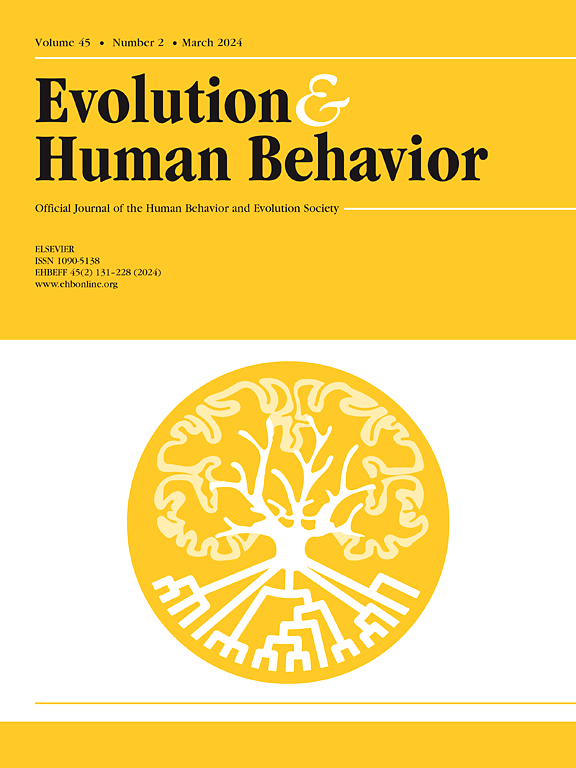People who are more likely to die care less about the future: Life insurance risk ratings predict personality
IF 3
1区 心理学
Q1 BEHAVIORAL SCIENCES
引用次数: 0
Abstract
Adaptationist models predict that individuals at higher risk of death will be calibrated to prioritize immediate over future benefits. However, operationalizing individual mortality risk in empirical studies has proven challenging. We introduce and explore a novel method of operationalizing individual mortality risk: Using the risk ratings assigned by actuaries to purchasers of individual life insurance policies. Participants, who had recently gone through underwriting as part of the insurance application process, completed self-report instruments to assess personality traits related to present-future tradeoffs and a putative fast-slow continuum of life history strategy. Study 1 (n = 270) found that insurance-based mortality risk associated negatively with a measure of slow life strategy and positively with a measure of short-term mating orientation. Study 2 (n = 402), which was preregistered, found that insurance-based mortality risk associated positively with impulsivity and negatively with conscientiousness and consideration of future consequences. Self-estimated mortality risk did not track insurance-based mortality risk, but was independently correlated with the same personality traits. We discuss the potential of insurance-based mortality risk estimates in behavioral research and the significance of these findings for adaptationist models of individual differences.
更有可能死去的人不太关心未来:人寿保险风险评级可以预测性格
适应主义模型预测,死亡风险较高的个体将被校准为优先考虑眼前利益而不是未来利益。然而,在实证研究中对个人死亡风险进行操作证明是具有挑战性的。我们介绍并探索了一种操作个人死亡风险的新方法:使用精算师分配给个人人寿保险单购买者的风险评级。作为保险申请过程的一部分,最近经历了承保的参与者完成了自我报告工具,以评估与现在-未来权衡和假定的快-慢连续生活史策略相关的人格特征。研究1 (n = 270)发现,基于保险的死亡风险与慢生活策略的衡量负相关,与短期交配取向的衡量正相关。预先登记的研究2 (n = 402)发现,基于保险的死亡风险与冲动性呈正相关,与责任心和对未来后果的考虑呈负相关。自我估计的死亡风险不跟踪基于保险的死亡风险,但与相同的人格特征独立相关。我们讨论了基于保险的死亡风险估计在行为研究中的潜力,以及这些发现对个体差异适应主义模型的意义。
本文章由计算机程序翻译,如有差异,请以英文原文为准。
求助全文
约1分钟内获得全文
求助全文
来源期刊

Evolution and Human Behavior
生物-行为科学
CiteScore
8.30
自引率
9.80%
发文量
62
审稿时长
82 days
期刊介绍:
Evolution and Human Behavior is an interdisciplinary journal, presenting research reports and theory in which evolutionary perspectives are brought to bear on the study of human behavior. It is primarily a scientific journal, but submissions from scholars in the humanities are also encouraged. Papers reporting on theoretical and empirical work on other species will be welcome if their relevance to the human animal is apparent.
 求助内容:
求助内容: 应助结果提醒方式:
应助结果提醒方式:


